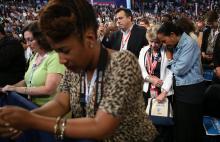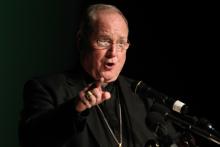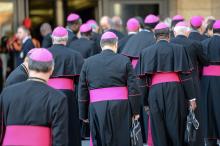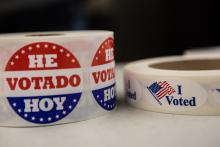Faith and Politics

Winston Churchill famously said, “Show me a young Conservative and I’ll show you someone with no heart. Show me an old Liberal and I’ll show you someone with no brains.”
Churchill was out of power by the time his countrymen, George Harrison and the Beatles, released “Taxman” on their Revolver album in 1966. New Prime Minister Harold Wilson had introduced a 95-percent supertax on the wealthiest Brits, including the Beatles. Harrison’s song was and remains a perfect Right-wing caricature of the Left. I can almost hear Bill O’Reilly singing an attack on President Obama’s plan to “ask the wealthiest Americans to pay a little more.”

Three Buddhists, a Hindu, and a “none” will walk into the 113th Congress, and it’s no joke. Rather, it’s a series of “firsts” that reflect the growing religious diversity of the country.
When the new Congress is sworn in next January, Hawaii Democrat Tulsi Gabbard, an Iraq war veteran, will represent the state’s 2nd Congressional District and will become the first Hindu in either chamber on Capitol Hill.
The 31-year-old Gabbard was born in American Samoa to a Catholic father and a Hindu mother, and moved to Hawaii as a child. She follows the Vaishnava branch of Hinduism, which venerates the deity Lord Vishnu and his primary incarnations.
Gabbard takes over the seat held by Rep. Mazie K. Hirono, who won a Senate race on Nov. 6 and will become the first Buddhist to sit in the upper chamber. There were already two other Buddhists in the House of Representatives, both of whom won re-election: Rep. Hank Johnson, a Georgia Democrat, and Rep. Colleen Hanabusa, a fellow Hawaii Democrat.
The Huffington Post reports:
It's been a sobering few decades for Christians who work alongside the poor, claim their feminism, respect scientific discovery, care for the earth, and yearn for marriage equality. We felt like the voice of Christianity had been captured by some strange ventriloquist, and it was proclaiming things that often contradicted our faith. We became frustrated with our own irrelevance, as our speech in the public square seemed to be on permanent mute.
And yet, we worked alongside the poor, remembering Mary, the mother of Jesus, a single woman expecting a child. Mary magnificently proclaimed that God had exalted the humble, filled the hungry with good things and sent the rich empty away.
Read more here.

The road to the White House is no longer white and Christian.
President Obama won last week with a voter coalition that was far more racially and religiously diverse than Mitt Romney’s – a phenomenon both predicted in the days before the election and confirmed in the days after.
What the Public Religion Research Institute has concluded since, however, has farther-reaching implications: that relying on white Christian voters will never again spell national electoral success — especially for the GOP.
“The changing religious landscape is presenting a real challenge to the strategy that relied on motivated white Christians, particularly white evangelical Christians,” said PRRI Research Director Dan Cox, referring to a PRRI study released Thursday.
A First Amendment watchdog group is suing the Internal Revenue Service for failing to challenge the tax-exempt status of churches whose pastors engage in partisan politicking from the pulpit.
The Freedom From Religion Foundation, which advocates total separation of church and state, filed the lawsuit Wednesday in U.S. District Court in Western Wisconsin, where the 19,000-member organization is based.
The lawsuit claims that as many as 1,500 pastors engaged in “Pulpit Freedom Sunday” on Sunday, Oct. 7, when pastors endorsed one or more candidates, which is a violation of IRS rules for non-profit organizations.
IRS rules state that organizations classified as 501(c)(3) non-profits — a tax-exempt status most churches and other religious institutions claim — cannot participate or intervene in “any political campaign on behalf of (or in opposition to) any political candidate.”

The day after the election, Southern Baptist Seminary President Albert Mohler said, “I think this was an evangelical disaster.”
Not really. But it was a disaster for the religious right, which had again tied its faith to the partisan political agenda of the Republican Party — which did lose the election. But Nov. 6 was an even deeper disaster for the religious right’s leaders, because they will no longer be able to control or easily co-opt the meaning of the term “evangelical.”
During this election, much of the media continued to use the word as a political term — as a key constituency of the Republican conservative base. But what the media really means when they use term “evangelical” is “conservative white evangelical.” All other kinds of evangelicals are just never counted.
Just as the 2012 electoral results finally revealed the demographic transformation of America — which has been occurring for quite some time — it also dramatically demonstrated how the meaning of the word “evangelical” is being transformed.
Evangelical can no longer be accurately used to mean “white evangelical.”
Charls C. Haynes writes in The Washington Post:
Buried in the mountain of demographic data preoccupying political pundits this week is one historic statistic that may have far-reaching consequences for religious freedom in America:
Seventy-nine percent of white Protestant evangelicals voted for Mitt Romney, a lifelong member of the Church of Jesus Christ of Latter-day Saints – popularly known as the Mormon Church.
After a bitter Republican primary season during which many evangelical leaders supported the “anybody but Romney” effort, prominent conservative Christian ministers lined up behind Romney for the general election. A defining moment came on Oct. 11 when America’s Preacher, the Rev. Billy Graham, publicly signaled support for Romney’s candidacy.
Read more here.
One group of Americans that took a beating in the recent election was the U.S. Catholic bishops. Many of them were not shy in expressing their opposition to the administration and their preference for a Romney presidency. They also fought and lost a series of state referendums on gay marriage.
Some in the Obama administration may feel that the election shows that the bishops can be ignored as leaders without followers. But it would be a mistake to count out an institution that has been around for 2,000 years. In fact, this is a situation where being a gracious victor is not only the right thing to do, it makes good political sense.
Read more here.
The Atlantic reports:
Ever since Ronald Reagan was elected president in 1980, evangelicals have been a powerful political force. Jerry Falwell and his Moral Majority organization were credited in part with Reagan's election, having registered millions of evangelicals to vote. Their influence would only grow over the next 25 years: Evangelicals were instrumental in Reagan's reelection, the Republican Revolution of 1994, and both of George W. Bush's victories. But on November 6, 2012, their reign came to an end.
"I think this [election] was an evangelical disaster," Albert Mohler, president of Southern Baptist Theological Seminary, told NPR. He's right, but it wasn't for lack of trying.
The late Falwell's Liberty University gave former governor Mitt Romney its keynote spot at its 2012 commencement and backed off previous language calling Mormonism a "cult." Billy Graham uncharacteristically threw his support behind the Republican candidate, and his evangelistic association bought full-page newspaper ads all but endorsing Romney. Ralph Reed's Faith and Freedom Coalition spent tens of millions in battleground states to get out the religious vote.
Read more here.
CNN reports:
Emboldened by the re-election of President Barack Obama, a cadre of liberal Catholic activists and groups is waging a campaign alleging that America's Catholic bishops are out of touch with Catholic laypeople.
The Catholic bishops, who are in Baltimore this week for a quarterly meeting, spoke out against the Obama administration during the election cycle over what they said were White House violations of religious freedom.
Some bishops also spoke out against legalized gay marriage and abortion rights, positions embraced by many Republicans.
A Sunday opinion piece in the National Catholic Reporter by Thomas Reese, a Jesuit priest at Georgetown University, hammered the bishops for their public proclamations during the campaign, saying the church leaders' “political strategy … is not working.”
Read more here:

This starts as a question: What can I do now, as a citizen?
On Nov. 6, the answer was clear. Vote. Vote. Vote.
Well and done. Four years ago, too, I voted in November on Election Day, with a box of Fruity Cheerios under one arm.
In the weeks leading up to the election, my civic heart was tuned well. Watch the debates. Discuss. Then vote, because, actually, the pressure is quite enormous. Vote or Die. The Facebook news feed can crush you, flatten you into voting, which is all well and good. I can be for that. Civic pressure.
But come Nov. 7, the pressure released. The civic duty was fulfilled. And my question remains, sincerely. What can I do now?
I ask the question; one, because I do not know the answer; two, because I have an entirely different answer. So first, the question stands: What can I do now, as a citizen?
The Los Angeles Times reports:
As the head of Focus on the Family, Jim Daly might be considered one of the nation's leading culture warriors — a title that certainly applied to his predecessor, James Dobson, who founded the organization and built it into a powerhouse of the conservative evangelical movement.
And, to be sure, Daly threw the considerable resources of his organization — which fiercely opposes abortion and same-sex marriage — behind the campaign to defeat President Obama, paying for millions of mailers that listed the presidential candidates' positions on issues that were important to “values voters.”In the aftermath of the election, however, Daly is willing to say things that few conservative evangelical leaders are likely to say. He believes, for instance, that the Christian right lost the fight against same-sex marriage in four states in part because it is on the losing side of a cultural paradigm. He says the evangelical community should have been considering immigration reform years ago, “but we were led more by political-think than church-think.”
Read more here.

When I stepped back and really thought about what I was experiencing on election night, I started thinking about the night of April 4, 1968, just hours after Martin Luther King, Jr. was assassinated. Having not yet been born, I thought about the coverage of it that I’ve seen. About how Robert Kennedy found himself in front of a crowd of supporters for a presidential campaign rally in Indianapolis. Many there that night were black and hadn’t heard the news of King’s death. As he did with most difficult topics, Kennedy laid it all out there. The crowd gasped and screamed and cried. Kennedy said he understood the anger and hate each of the men and women there that night would probably feel. After all, a white man had also killed his brother.
“What we need in the United States is not division,” Kennedy told the crowd. “What we need in the United States is not hatred. What we need in the United States is not violence and lawlessness, but is love and wisdom and compassion toward one another. A feeling of justice toward those who still suffer within our country.”
Christian Post reports:
When the new members of Congress are sworn in on Jan. 3, the institution that once mirrored the nation's Protestant Christian dominance will look slightly more like the religiously diverse nation it represents. The new Senate will seat a Buddhist member for the first time and the House of Representatives will have its first Hindu member.
Rep. Mazie Hirono (D-Hawaii), who currently serves in the House of Representatives, won her Senate race last week and will be sworn in as the Senate's first Buddhist. Hirono's House seat will be filled by Tulsi Gabbard, who will become the first Hindu in Congress. Hirono will also be the first Asian-American female and the first person born in Japan to be elected to the U.S. Senate.
Read more here.
Eric Sapp writes for The Huffington Post:
In recent years, there has been a trend in politics away from any mention of the poor. Republicans never really paid them any mind, but Democrats have been convinced they should not make any mention of the poor, and instead, focus exclusively on the middle class. The decision to stop talking about the poor was, for Democrats, based on polling data. Pollsters have tested traditional progressive language about the "poor, vulnerable, and needy" and seen that voters don't have a very high opinion of those groups. Furthermore, polling shows that most voters want to self-identify as "middle class."
Because of all of this, many Democrats have reached the conclusion that mentioning the poor or openly championing policies that explicitly benefit them is a political loser. This conclusion has very dangerous policy and strategic implications (especially with the looming sequestration debate) and will ultimately box Democratic leaders into a corner where they have no choice but to sacrifice programs that struggling American families depend on the most. Thankfully, in this case, we don't have to choose between doing what is right and what works politically.
Read more here.
Stephen Prothero writes for the CNN Belief Blog:
It’s demography, stupid!” is the new mantra for analyzing the 2012 election, in which African Americans, Asian Americans and Latinos cast their votes in overwhelming numbers for President Obama.
But religious diversity was another key theme. How so? Let me count the ways.
1. The first Hindu in the House
Thanks to Hawaii’s 2d congressional district, a Hindu has been elected for the first time to the House of Representatives. Tulsi Gabbard, a Democrat who was born in American Samoa, served in the Hawaii National Guard and was deployed to Baghdad and Kuwait, crushed Republican Kawaki Crowley with over three-quarters of the votes. Gabbard is a Vaishnava Hindu, which means she worships Vishnu. The key scripture in her Hindu tradition is the Bhagavad Gita, a meditation on duty in the face of war....
Read more here.

BALTIMORE — After sweeping setbacks to the hierarchy’s agenda on Election Day, New York Cardinal Timothy Dolan on Monday told U.S. Catholic bishops that they must now examine their own failings, confess their sins and reform themselves if they hope to impact the wider culture.
“That’s the way we become channels of a truly effective transformation of the world, through our own witness of a repentant heart,” Dolan, president of the U.S. Conference of Catholic Bishops, told the 250 bishops gathered here for their annual meeting.
“The premier answer to the question ‘What’s wrong with the world?’ is not politics, the economy, secularism, sectarianism, globalization, or global warming … none of these, as significant as they are,” Dolan said, citing many of the issues that have become favorite targets of the hierarchy.
Christian Post has a great round up of election coverage from a Christian perspective.
Conservative Christians are not hiding their disappointment in the outcome of the 2012 election. Not only did the candidates that they supported not win but they also saw losses in the marriage and pro-life battles.
"'On every level – presidential, congressional, social – it was a bruising day for our movement that no amount of spin can improve," wrote Tony Perkins, president of Family Research Council, in an email to supporters. "Americans had a choice, and they made it. Is the outcome what we want? Obviously not.'
GOP candidate Mitt Romney lost the presidential election to President Barack Obama after losing most key battleground states, including Ohio. Obama surpassed the 270 electoral votes needed to win a second term and also won the popular vote."
Read more here.

As the bishops gather in Baltimore this week for their annual meeting, they like everyone else in the country will be talking about last week’s election. The U.S. Catholic bishops took a beating at the polls. Not only was President Obama reelected, despite their attacks on him, the bishops also lost on state referendums on same-sex marriage.
Like all Americans, the bishops have a constitutional right to participate in the political process. They can debate the issues, criticize candidates and publicly express their views. They can even endorse candidates as long as they don’t do it on church property and don’t use church funds in supporting a candidate or party. In fact, they can even run for president as did Rev. Pat Robertson and Rev. Jesse Jackson. The U.S. Constitution does not forbid this; Roman Catholic canon law forbids it.
But what is constitutional is not always effective or prudent. Clearly the political strategy of the bishops is not working. A majority of Catholics voted for Obama and gay activists won every referendum. The Missouri and Indiana Republican senatorial candidates, who took the toughest positions on abortion, were also defeated when the Republicans were expected to win these races.
So where do the bishops go from here?

Exit polling from Tuesday’s presidential election is offering new hope to activists advocating for comprehensive immigration reform. The Latino community was instrumental in reelecting President Barack Obama, as record numbers turned out to vote and supported the president by over 70 percent. These numbers send a clear message to opponents of immigration reform that demonizing immigrants and blocking progress makes for a poor political strategy.
Pundits are opining that Congress may be more willing to discuss comprehensive reform, a promise President Obama made but has been slow in fulfilling due to congressional opposition. Indeed, republican leaders in Congress have already been altering their positions.